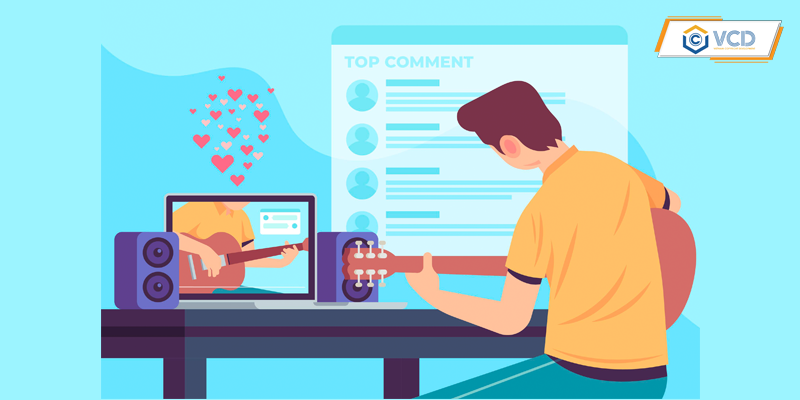Music copyright in streaming services
The development of technology and the Internet has expanded the ability to transmit musical works to the public through streaming platforms. However, along with the convenience and popularity of these services, the problem of copyright infringement has also become more complicated. So, what is music copyright in streaming services? Please follow VCD’s article below.
1. Concept of music copyright in streaming services
According to the provisions of intellectual property law, music copyright is the legal rights of authors, composers, performers, and music producers over their musical works. Copyright ensures that music authors and producers have the right to control the use and exploitation of their works, and to receive compensation for that use.
Streaming is a fairly new term that is a product of scientific and technological development; considered an alternative to traditional file downloads: allowing streaming to provide content such as soundtracks for users to watch or listen to on an immediate and ephemeral basis.
From a legal perspective, there is currently no definition of the concept of online broadcasting or regulation of this behavior.
Online streaming services (also known as streaming services) are platforms or applications that provide media content such as music, videos, movies, TV shows, and other multimedia content through the Internet. Instead of having to download completely before it can be viewed or listened to, content is streamed directly from the service’s servers to the user’s device, allowing for immediate viewing or listening.
Therefore, Music Copyright on streaming services refers to the copyright protection of musical works when they are made available and accessible via streaming platforms such as Spotify, Apple Music, YouTube, Amazon Music, and similar services.

2. Legal regulations on music copyright in streaming services
Copyright under the current Intellectual Property law includes the author’s personal rights and property rights as specified in Article 19 and Article 20 of Consolidated Document No. 07/VBHN-VPQH.
Regarding Copyright, streaming is essentially a channel for transmitting works to the public through the creation of temporary copies and users directly viewing and listening to audio or images. To carry out online streaming activities, users often have to use two groups of rights including the right to copy works and the right to communicate works to the public as stipulated in Clause 1, Article 20 of this Law. At the same time, Clause 3, Article 20 further recognizes that in cases where organizations and individuals exploit and use one, some or all of these rights, they must apply for permission and pay royalties, remunerations and other benefits. other material for the owner. In other words, when streaming works online, there must be at least the consent of organizations and individuals who are copyright owners, except for the exceptions specified in Articles 25 and 26 of this Law.
Legal streaming services include all internet service providers that provide access to catalogs of musical or audiovisual works with the permission of the copyright owners. For example, platforms for streaming legal music works such as Spotify, Deezer, Apple Music… Accordingly, people who access these platforms must pay a certain fee to the service provider. The supplier is responsible for paying royalties and remunerations for the use of musical works to the copyright owner according to the Contract or according to the agreement between the parties.
There are also semi-legal live streaming services that provide access to copyrighted works through streaming without requiring permission from the copyright owner. The intermediary provides this service in case of illegal online streaming or at the request of a competent state agency to remove infringing content. Examples of sharing platforms are YouTube, Dailymotion, hosting services, or other similar content service providers.
Intermediary services play a significant role in communicating and distributing works to the public, including increasing or decreasing the value of musical works. Especially in cases where copyright infringement occurs, the enterprise providing this service is the first entity capable of preventing the infringement.
According to the provisions of Clause 3, Article 198b Draft dated March 24, 2022, of the Law amending and supplementing many articles of the Intellectual Property Law, enterprises providing intermediary services are exempt from liability in case of failure to comply. knowing that such digital information content violates copyright and related rights; Take action to quickly remove or prevent access to such digital information content when knowing that such digital information content violates copyright or related rights.
Similarly, Article 23d of Decree No. 27/2018/ND-CP dated March 1, 2018, of the Government (amending and supplementing many Articles of Decree No. 72/2013/ND-CP dated July 15, 2013, of the Government on management, provision, and use of Internet services and online information) regulates information management conditions for general electronic information sites and social networks, setting out basic requirements. coordination mechanism to immediately remove content that violates Clause 1, Article 5 of this Decree no later than 03 hours after self-discovery or request from the Ministry of Information and Communications or licensing agency (in writing). text, phone, email). Therefore, this is the responsibility, but also a right of businesses when providing intermediary services to perform management activities for information sources distributed on the platform they provide.
In conlusion, VCD finds that streaming is an effective way to convey music to the public, but also poses many copyright challenges. Using music without a license and without paying royalties is a serious violation of copyright. Legal and technological solutions need to be implemented synchronously to protect the rights of music authors and producers. International cooperation and the active participation of copyright management organizations also play an important role in solving this problem.
